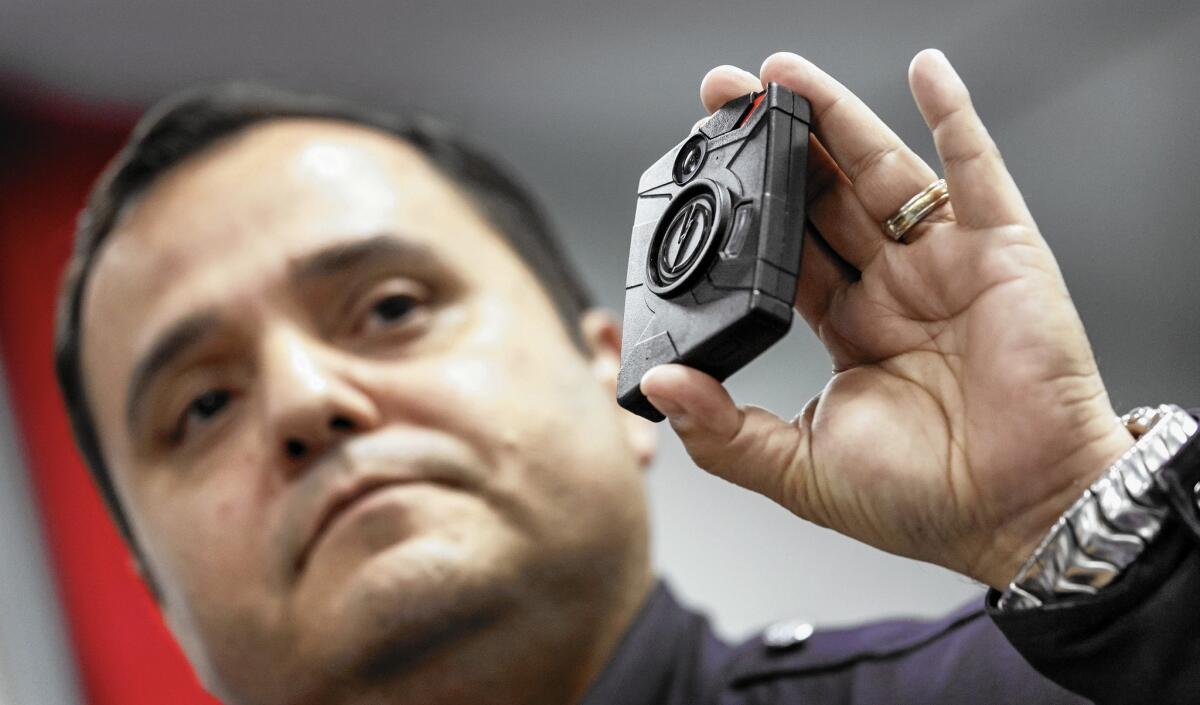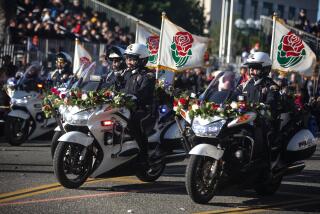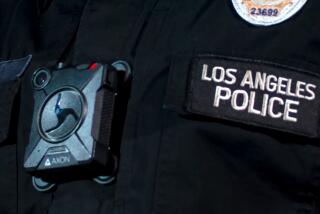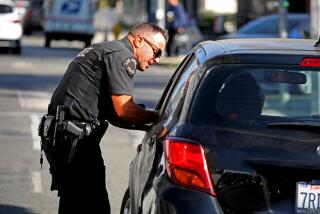‘Tired of prayer vigils’: California debates 20 bills aimed at police force

Sgt. Daniel Gomez displays a body camera during a public meeting in January hosted by the Los Angeles Police Commission.
As last week’s protests in Baltimore renewed the national debate on the use of force by police, California lawmakers have been grappling with how to address the fractured relationship between law enforcement and minority communities.
At least 20 proposals to regulate body cameras worn by cops, revamp the prosecution of deadly force cases and impose other measures were made in the wake of high-profile killings by police in Ferguson, Mo., New York City, Cleveland and elsewhere. Lawmakers are trying to capitalize on the heightened public interest in one of the country’s most vexing social and political problems.
“I’m tired of being shocked. I’m tired of prayer vigils. I’m tired of sit-ins and walks,” said Assemblywoman Shirley Weber (D-San Diego). “I’m saying to my members that you tell me every day how horrible, how sad this is. What are you going to do about it?”
But legislators are divided on what effects many of the proposals would have. Their different approaches are apparent among members of the Black Legislative Caucus, such as Weber and Assemblyman Jim Cooper (D-Elk Grove), who said many of the proposals fail to address core issues.
“Poor areas have been that way forever, for decades — crime-ridden, underperforming schools, no banks, no supermarkets and no sports league or arts for the kids,” said Cooper, who previously served as a captain in the Sacramento County Sheriff’s Department.
“Until those problems get addressed, everything we’re doing is putting Band-Aids on a wound that’s been festering for decades now,” he said.
Meanwhile, the flurry of proposals has put law enforcement groups on their heels.
“We are more under the microscope,” said Chula Vista Police Chief David Bejarano, president of the California Police Chiefs Assn.
Although his and other law enforcement groups say they’re open to some new proposals, such as increased training, Bejarano cautioned, “we have to be careful we don’t overreact and go too far one way or the other.”
The thorniness of these issues was on display as lawmakers wrestled last week with a proposal by Weber to impose statewide guidelines for the use of body-worn cameras by law enforcement agencies.
Use of the cameras has garnered attention in all corners of law enforcement, from the federal Department of Justice, which announced on Friday a $20-million pilot program to fund cameras for local police departments, to the Los Angeles Police Department, which will outfit all patrol officers with such equipment under city rules approved last week.
In Sacramento, legislators have introduced at least five measures pertaining to body cameras, including one that would establish grant funding to pay for the equipment, another proposing guidelines for data storage and one that would address how footage would be subject to public records laws.
Police groups say they generally support more use of body cameras. But Weber’s bill has generated fierce disputes, particularly over how soon officers would be able to view their cameras’ footage after an incident resulting in death or serious injury.
Weber and her backers, including the American Civil Liberties Union and the NAACP, initially wanted to prevent officers from reviewing the video until after making an initial statement. But they hammered out a shaky compromise with law enforcement groups Thursday in which nearly all officers would be able to review their footage before making a report.
With advocates and police groups still somewhat wary of the agreement, the measure, AB 66, faces a tough slog through the Legislature.
Some advocacy groups calling for stricter police accountability laws have been cool to body camera proposals. They fear that politicians are embracing a quick technological fix for deeper rifts between law enforcement and communities that require more comprehensive solutions, such as more funding for mental health services.
“The culture of the [police] department will override training and find ways around policy,” said Mark-Anthony Johnson, of Dignity and Power Now, a Los Angeles prisoners’-rights organization.
Johnson did endorse a pair of bills by Weber that would generate more data on policing tactics. One, AB 619, would require annual reporting of use-of-force incidents, and the other, AB 953, would require law enforcement to submit reports on each stop, search or seizure.
Proponents say information that could be gathered under the latter bill would help illustrate the extent of racial profiling in police encounters. An array of law enforcement groups opposes such reporting requirements as onerous.
But Johnson said that with the proposed additional data, “we’ll have a much more clear picture of the breadth and scope of the problem” of racial profiling.
Lawmakers are also seeking to change the way police-involved deaths are treated in the judicial system.
Sen. Holly Mitchell (D-Los Angeles) wants to prohibit the use of secret grand juries in cases involving the use of force by police. She proposes instead that prosecutors use preliminary hearings to determine if there is enough evidence to bring charges against an officer.
Mitchell’s measure, SB 227, is opposed by the California District Attorneys Assn. It argues that California’s grand jury system already has controls in place for fairness, such as strict limits on hearsay evidence.
Another measure would require the state attorney general to appoint an independent special prosecutor to handle use-of-force cases. The proposal is intended to address community concerns that local prosecutors may be too closely aligned with law enforcement to be fair-minded in such cases.
“The review process isn’t as open and transparent and independent as it should be,” said Assemblyman Kevin McCarty (D-Sacramento), author of the bill, AB 86, which faces opposition from law enforcement groups that say district attorneys are well qualified to handle such cases.
Twittter: @melmason
More to Read
Start your day right
Sign up for Essential California for news, features and recommendations from the L.A. Times and beyond in your inbox six days a week.
You may occasionally receive promotional content from the Los Angeles Times.







